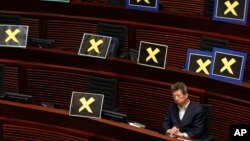Political tensions continue to rise in Hong Kong.
Pro-democracy legislators are promising to block China’s plan for electoral reform in the territory. The plan calls for electing a city leader from a list of candidates approved by the central government in Beijing.
Democracy activists say they will travel throughout Hong Kong over the next several weeks. They want to convince people to support the direct election of Hong Kong’s chief executive.
Last year, pro-democracy activists shut down parts of the city for months.
Earlier this year, Hong Kong’s government released a plan for election reform that is almost exactly the same as one proposed by China. It lets people vote for the city’s leader. But they can only choose from a list of candidates chosen by a committee loyal to the Chinese central government.
Emily Lau is the head of Hong Kong’s Democracy Party. She says she and other pro-democracy lawmakers will not permit the plan to be approved.
“I think the proposal by the Hong Kong government is not good enough. It doesn’t meet even basic demands of a genuine democratic election. So we are going to vote against it. I think many of the pro-democracy legislators in the legislative council are going to vote against it.”
After Hong Kong’s government released its plan, pro-democracy legislators left the city’s parliament building. Most of them wore black shirts with a yellow cross on the front to protest the government’s election plans.
Two-thirds of the city’s legislators must vote for the plan if it is to become law. For that to happen, China and the Hong Kong government would have to convince at least four of the pro-democracy legislators to support the plan.
Hong Kong’s chief executive C.Y. Leung recently spoke to reporters. He warned the city’s voters that, if their legislators do not support Hong Kong’s election plan, it might be a few years before a new plan can become law.
But many Hong Kong citizens -- especially young people -- say if the government’s plan becomes law, it would weaken the pro-democracy movement.
Pa Sha is a protestor.
“Well, I think the best scenario is that it will be vetoed, to show that the people of Hong Kong will not be cheated by this fake proposal, fake reform.”
The pro-democracy movement has broken up into different groups since hundreds of thousands of demonstrators gathered in Hong Kong last year. Many supporters have left the Federation of Students, which was one of the main organizers of the demonstrations. They disagree with the direction of the movement. Some students say they want to take stronger action. They have protested near Hong Kong’s border with mainland China by shouting at and threatening Chinese travelers and shoppers visiting Hong Kong.
Although the students and other protestors disagree about methods, the movement appears to have support among people who live in Hong Kong. A recent study of public opinion found that fewer than half of the city’s residents support the government’s plan. It was least popular among Hong Kong’s well-educated young people. The study found 55 percent of those who have at least a college education oppose the plan. Sixty-three percent of those between the ages of 18 and 29 oppose it.
No large protests have been announced. But demonstrations could begin again if pro-democracy legislators switch their vote and the plan becomes law. Joseph Cheung is a professor at the City University of Hong Kong.
“If some pro-democracy legislators have been pressured to change their position and endorse the political reform bill, it is expected that there will be pretty large-scale protests initiated by the student groups in general.”
Recently, eight people were arrested during a small pro-democracy protest in the Hong Kong neighborhood of Mong Kok. Television reports showed police using pepper spray and sticks against a crowd of protesters who were trying to block traffic.
I’m Jim Tedder.
Shannon van Sant reported this story from Hong Kong. Christopher Jones-Cruise adapted it for Learning English. Mario Ritter was the editor.
_____________________________________________________________
Words in This Story
genuine – adj. actual, real or true; not false
scenario – n. a description of what could possibly happen
veto – v. to reject or refuse to approve
endorse – v. to publicly support or announce approval of
initiate – v. to cause something to begin; to start something
Do you support democracy in Hong Kong? We want to hear from you. Write to us in the comments section.





